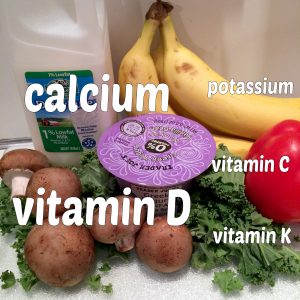Are You At Risk for Bone Loss?
 May is National Osteoporosis Prevention Month! Osteoporosis is a disease of the bone that makes your bones weak and more likely to break. According to the National Osteoporosis Foundation, ~10 million Americans have osteoporosis and another 44 million have low bone density, putting them at increased risk for osteoporosis.
May is National Osteoporosis Prevention Month! Osteoporosis is a disease of the bone that makes your bones weak and more likely to break. According to the National Osteoporosis Foundation, ~10 million Americans have osteoporosis and another 44 million have low bone density, putting them at increased risk for osteoporosis.
Even though the numbers may seem discouraging, osteoporosis is preventable. You cannot feel your bones getting weaker, so it is important to take preventative steps. Increasing your calcium and vitamin D intake, along with regular exercise can improve your bone health and reduce your risk of developing osteoporosis.
Are You at Risk?
There are many factors that determine who will develop osteoporosis. Some of the risk factors include:
- Gender. Women have a greater risk of developing osteoporosis because they have less bone tissue and lose bone more rapidly than men.
- Age. Anyone over age 50 is at an increased risk.
- Activity level. Sedentary lifestyle with little or no weight-bearing exercise.
- Lifestyle. Alcohol abuse, cigarette smoking and high caffeine intake.
Improving Your Bone Health
Incorporate enough calcium and vitamin D every day:
- Add low-fat Greek yogurt to your breakfast or have it as a midday snack for more calcium.
- Include green vegetables that are rich in calcium into your favorite recipes. Try broccoli, kale, and turnip greens.
- Buy milk or milk alternatives that are fortified with calcium and/or vitamin D.
- Eat fatty fish twice a week, such as mackerel, salmon, sardines and tuna for more vitamin D.
Engage in weight-bearing, resistance and balance exercises:
- Go for a brisk walk with your partner, friend, kids or dog.
- Join a group exercise class such as Zumba.
- Include resistance exercises in your workout by using light dumbbells.
- Do balance exercises every day, such as balancing on one leg, to prevent a fall.
It is also important to have an overall healthy diet to keep your bones healthy. Eat five or more fruits and vegetables a day and keep processed foods to a minimum. Other nutrients, such as vitamin K, potassium, magnesium and vitamin C all play a crucial role in keeping your bones healthy.
Talk With Your Doctor
Make an appointment with your primary care doctor to talk about your bone health. Your doctor will be able to educate you on your risk factors and answer all your bone health questions. You can also ask your doctor for a bone density test or any other test you may need to appropriately assess your bone health.
It is also important to meet with a registered dietitian who can help you incorporate more calcium, vitamin D and fruits and vegetables into your meals. A registered dietitian will help you come up with a plan to help you prevent further bone loss. Connect with me here.
Remember, you are never too young or too old to protect your bones!
Your Turn to Take Action: What will you do to reduce your risk of osteoporosis? Share below in the comments section.


Leave a Reply
Want to join the discussion?Feel free to contribute!